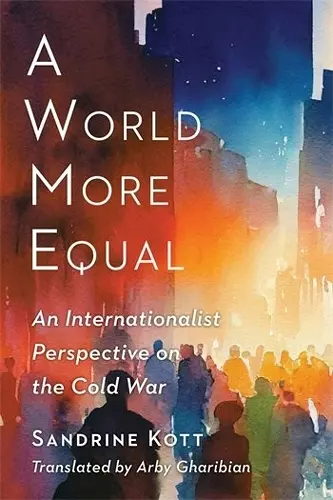A World More Equal
An Internationalist Perspective on the Cold War
Sandrine Kott author Arby Gharibian translator
Format:Paperback
Publisher:Columbia University Press
Published:5th Mar '24
Currently unavailable, and unfortunately no date known when it will be back

The post–World War II period is typically seen as a time of stark division, an epochal global conflict between the United States and the Soviet Union. But beneath the surface, the postwar era witnessed a striking degree of international cooperation. The United Nations and its agencies, as well as regional organizations, international nongovernmental organizations, and private foundations brought together actors from conflicting worlds, fostering international collaboration across the geopolitical and ideological divisions of the Cold War.
Diving into the archives of these organizations and associations, Sandrine Kott provides a new account of the Cold War that foregrounds the rise of internationalism as both an ideology and a practice. She examines cooperation across boundaries in international spaces, emphasizing the role of midsized powers, including Eastern European and neutral countries. Kott highlights how the need to address global inequities became a central concern, as officials and experts argued that economic inequality imperiled the creation of a lasting peace. International organizations gave newly decolonized and “Third World” countries a platform to challenge the global distribution of power and wealth, and they encouraged transnational cooperation in causes such as human rights and women’s rights. Assessing the failure to achieve a new international economic order in the 1970s, Kott adds new perspective on the rise of neoliberalism. A truly global study of the Cold War through the lens of international organizations, A World More Equal also shows why the internationalism of this era offers resources for addressing social and global inequalities today.
This terrific history of the last great efforts to effect global coordination and cooperation could not be more timely given the enormous and extraordinarily dangerous challenges the world faces today. It is a powerful corrective to the notion that conflict means the end of cooperation, showing that internationalism was not marginal to the Cold War, but a characteristic feature of it. -- Patricia Clavin, author of Securing the World Economy: The Reinvention of the League of Nations, 1920–1946
In this immensely stimulating study, Sandrine Kott delineates exciting new paths for twentieth-century international and global history. Using international organizations as sites to explore the shifting balance of social, economic, and political forces between the Western, Communist, and Third worlds, Kott shows that the Cold War was much more than simply a struggle between two superpowers. -- Talbot C. Imlay, author of The Practice of Socialist Internationalism: European Socialists and International Politics, 1914-1960
This brilliantly written book offers a new understanding of the Cold War through the lens of international organizations. Kott unfolds various forms of internationalisms, whose impact, form, and content revolve around the global scale of social and economic inequality during the Cold War period. -- Madeleine Herren, coauthor of Transcultural History: Theories, Methods, Sources
ISBN: 9780231210157
Dimensions: unknown
Weight: unknown
312 pages